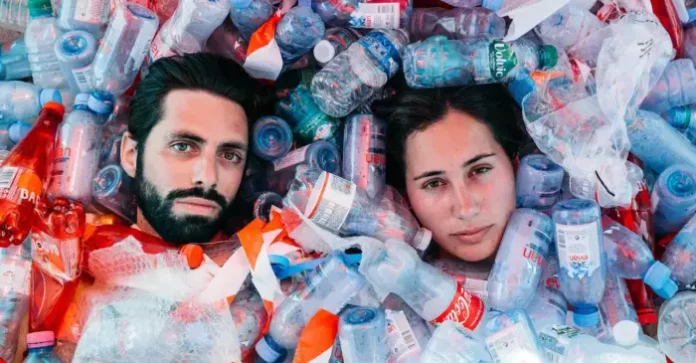
Our daily actions can affect our own health, starting with the products we buy or how we sort our waste. It is estimated that each of us ingests around 5 grams of plastic per week. With the new provocation #IlPandaSiamoNoi and the Sustainable Future campaign, the WWF is also talking about plastic and recounting the impacts of our consumption choices but also the fundamental role we all play with our daily actions, for the Planet and for our future. It does so by launching the third and final Survival Guide for a Sustainable Future entitled ‘Life in plastic, it’s not fantastic’.
The dispersion of plastic in nature and our exposure to the chemicals associated with it – and released by it – are mainly due to our systems of consumption, production and management of plastic waste. WWF’s long-standing complaint is: we are surrounded by plastic. And we must necessarily do something to limit its dispersion in the environment. Food, cosmetics, clothes, toys, containers and much more. Even small products can be ‘over-packaged’ in many different plastics, sometimes mixed with other materials. We produce and use too much plastic, even when it is not necessary, and we recycle too little.
The spread and abundance of plastics in the air, water, sea, soil and organisms is so extensive that many scientists use it as a key indicator of recent and contemporary times, defining a new historical epoch: the Plasticene, in which one material, plastic, has rewritten the history of this Planet. Plastic is now the third most widespread man-made material on Earth, after steel and concrete. In the last 60 years, we have produced over 8 billion tonnes of plastic, an unimaginable amount, which has meant that the mass (by weight) of all plastic on the Planet is twice the total biomass of land and sea animals combined.
Worldwide, one million plastic bottles are purchased every minute and more than one million bags are used. Of all the plastic produced, over 70% has already become waste. Of this discarded plastic, on average only 9% is recycled worldwide, while 79% ends up in landfills and in the terrestrial and marine environment. In the oceans alone, 11 million tonnes of plastic end up each year, contaminating species and habitats.
Plastic persists in the environment, where there are no real boundaries; therefore, it is possible that an object, a piece of plastic waste that we flush down our toilet or out of the rubbish bin behind the house, can also travel around the world and end up somewhere else on the Planet. Plastics have also been found in the depths of the ocean, on mountain peaks and even at the poles in the most remote places on the Planet, so much so that scientists claim that there is now a true global environmental cycle of plastic, on a par with that of carbon and other natural elements.
Plastics have also been found inside us and it is estimated that we ingest over 100,000 microplastics from food, air and water every day. Despite this, a world without plastics seems unimaginable today, having brought great benefits to humanity and made possible some of the most significant advances of modern civilisation in fields as diverse as medicine, electronics, and transport. Instead, in many cases it is possible to do without them.
Solutions in the new WWF Guide
In the guide ‘Life in plastc it’s not fantastic’ the WWF proposes simple solutions and concrete actions for a more sustainable lifestyle with less plastic. “Involving people in solutions to reduce plastic loss in nature is crucial. This is why we raise awareness among citizens to reduce plastic in their lives by promoting a reduction in consumption, an increase in reuse, recycling and the use of natural biodegradable and compostable materials, as well as promoting correct waste management – says Eva Alessi, WWF Italy’s sustainability manager -.
But institutions must also play their part. WWF works with institutions to improve regulations through the revision of directives on plastic management, promoting the extension of separate plastic collection to all high-consumption production sectors, to increase the types of objects destined for recycling (today limited to packaging only), facilitating industrial symbiosis, promoting the use of digital technologies for the traceability of resources and incentives for the use of reusable and recycled products. We are also working with cities, mainly through the Plastic Smart Cities Initiative, which in Italy sees Venice as one of the participating cities, and with industries to push the eco-friendly design of products and packaging following eco-design criteria, focusing on durability and reusability, increasing the use of recycled materials, developing the regenerative bio-economy, and increasing the use of green technologies in line with the principles of a circular economy.”
On an issue as complex as plastics, an all-encompassing approach is needed in a European regulatory context aiming at greater sustainability, as demonstrated by the Strategy for Plastics in the Circular Economy, the new Packaging and Packaging Waste Directive, the new Regulation on microplastics intentionally added to products and measures to reduce pellet pollution. All these measures on plastics are also linked to the issue of climate change. Plastics have a significant carbon footprint, contributing 3.7% of global greenhouse gas emissions during their life cycle, both because the vast majority of plastics come from oil, which has to be extracted and refined, and because once used, if incinerated, they cause further emissions. It is therefore crucial to act on the plastics issue as well in order to meet the Green Deal targets and stay within a global scenario of a global temperature increase within 1.5 degrees.
WWF urges states to use the upcoming negotiating session (INC-3) in Nairobi from 13 to 19 November 2023 to develop a treaty that includes binding global standards essential to end plastic pollution.






































